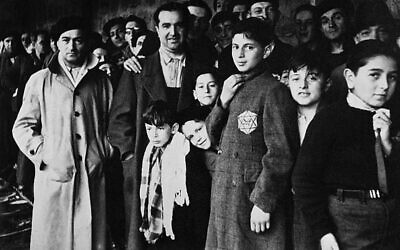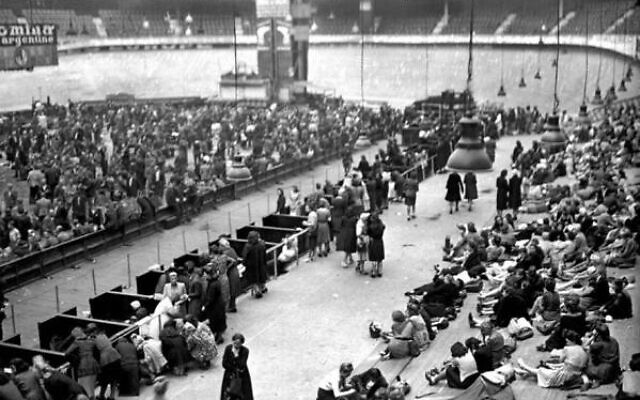‘Britain failed French Jews when we needed her most’
A British Holocaust refugee who was in Paris when Jews were rounded up and deported from the city in 1942 has criticised the government’s response to events 80 years ago this week.
A British Holocaust refugee who was in Paris when more than 13,000 Jews were rounded up and deported from the city in 1942 has criticised the British government’s response to events in France 80 years ago this week.
Joan Salter, who educates children in the UK through the Holocaust Memorial Day Trust, was speaking to Jewish News about the infamous mass arrest and internment of foreign Jews at the Vel d’Hiv, a winter sports stadium close to the Eiffel Tower, from 16 to 7 July 1942.
Although France was occupied during the war, the collaborationist Vichy government offered safe passage to thousands of Jewish children – most of them Polish – who had been rounded up. Salter, who was a young Jewish child in Paris at the time, recalled her narrow escape.
“About a week before [Vel d’Hiv], my mother took us to register [as foreign Jews]. I was two-and-a-half. Typical of two young children, we started having a row in the place and the policeman kicked us out, which was lucky.
“When we went back two days later, a nicer policeman warned my mother that we were going to be picked up that week. Had he not done, we’d have gone to Drancy and I wouldn’t have survived.”
While the United States sent a ship for the refugees, the UK made excuses, even though – almost two years earlier – 10,000 Jewish children from countries like Austria and Czechoslovakia were brought to the UK by train and given refuge in the Kindertransport.
That same willingness to help Jewish children, who were this time caught up in Paris, was sadly lacking in 1942, said Salter. “With Holocaust education, I feel you need historic facts, and the idea that Britain always accepted refugees is a load of rubbish.”

She explained that this reluctance stemmed in part from the unfavourable views held by British Jews of Polish Jews at that time.
“The pressure put on the [British] political establishment by the luminaries of the Anglo-Jewish establishment to rescue the Kinder, as well as the speed with which this rescue mission was enacted, was in direct contrast to their response to the children of Polish ancestry trapped in France,” she said.
“Anglo-Jewish leaders’ historic stance towards Polish Jews – regarded as the destabilising cause of antisemitism and Zionism – was ongoing and shared by the British political establishment. This predisposed them to an unenthusiastic response to the offer made by the Vichy government to enable the rescue of the children.”
According to Salter, documents found in the Public Records Office also showed that “the government were well aware of the plight of the children at a time that something could have been done”.
In February 1943, in the House of Commons, Foreign Secretary Anthony Eden was asked about the 2,000 Jewish children in France “who were refused visas for this country and were, in consequence, deported to Germany”. Not true, he said.
“I have no knowledge of any Jewish children in France having been refused visas for this country and having in consequence been deported to Germany. It is, in my opinion, much to be deplored that any story to this effect should be in circulation.”
He said “the Vichy authorities had declined to allow any Jewish children to leave France” but later admitted that visa applications had been made. In fact, as papers later showed, he was present on 28 September 1942, when the War Cabinet discussed the question of rescuing the French children.
According to Salter, documents found in the Public Records Office also showed that “the government were well aware of the plight of the children at a time that something could have been done”.
In fact, British diplomats were on record as having said that refuge would be offered only “in some rare and exceptional cases”, if it could be shown that “the admission of the refugees will be directly advantageous to our war effort”. Ultimately, she says, “it came down to prejudice, even among Jews… The divisions between different ethnic groups within the Jewish community at the time played out.”
She added: “The Anglo-Jewish elite were integrated, powerful and very anti-Zionist. They saw themselves as Englishmen of Jewish heritage, and of course one place the children might have gone was Palestine.”

Thank you for helping to make Jewish News the leading source of news and opinion for the UK Jewish community. Today we're asking for your invaluable help to continue putting our community first in everything we do.
For as little as £5 a month you can help sustain the vital work we do in celebrating and standing up for Jewish life in Britain.
Jewish News holds our community together and keeps us connected. Like a synagogue, it’s where people turn to feel part of something bigger. It also proudly shows the rest of Britain the vibrancy and rich culture of modern Jewish life.
You can make a quick and easy one-off or monthly contribution of £5, £10, £20 or any other sum you’re comfortable with.
100% of your donation will help us continue celebrating our community, in all its dynamic diversity...
Engaging
Being a community platform means so much more than producing a newspaper and website. One of our proudest roles is media partnering with our invaluable charities to amplify the outstanding work they do to help us all.
Celebrating
There’s no shortage of oys in the world but Jewish News takes every opportunity to celebrate the joys too, through projects like Night of Heroes, 40 Under 40 and other compelling countdowns that make the community kvell with pride.
Pioneering
In the first collaboration between media outlets from different faiths, Jewish News worked with British Muslim TV and Church Times to produce a list of young activists leading the way on interfaith understanding.
Campaigning
Royal Mail issued a stamp honouring Holocaust hero Sir Nicholas Winton after a Jewish News campaign attracted more than 100,000 backers. Jewish Newsalso produces special editions of the paper highlighting pressing issues including mental health and Holocaust remembrance.
Easy access
In an age when news is readily accessible, Jewish News provides high-quality content free online and offline, removing any financial barriers to connecting people.
Voice of our community to wider society
The Jewish News team regularly appears on TV, radio and on the pages of the national press to comment on stories about the Jewish community. Easy access to the paper on the streets of London also means Jewish News provides an invaluable window into the community for the country at large.
We hope you agree all this is worth preserving.






















